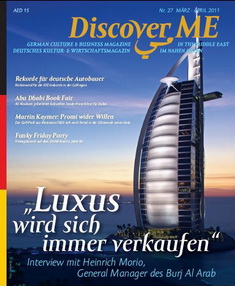
Article:
ISSUE No.6 September - October 2007
Real Estate Regulations
New Law concerning Guarantee Accounts for Real Estate in Dubai
The Emirate of Dubai has enacted another exemplary law in the region; the Law No. 8 concerning Guarantee Accounts for Real Estate. The law is exemplary for the region and may soon be used in other Arab countries in a similar form.
There has not been a Federal Property Law in the United Arab Emirates and most of the other Arab countries. For years, the seven Emirates – Abu Dhabi, Dubai, Fujairah, Ras Al Khaimah, Sharjah, Ajman and Um Al Quwain – have enacted individual regulations regarding the purchase of property. Since 2006, non-UAE nationals are empowered by law to purchase properties in the Emirate of Dubai, as freeholds in the so-called, “Freehold Property Areas”. This law opened the possibility of registering the freehold property in the Dubai Land Department under the buyer’s name. This liberalization of Dubai’s property market became so popular that its neighboring Arab Countries came up with a similar scheme.
In addition to the above mentioned regulation, the Emirate of Dubai has passed Law No. 8 concerning Guarantee Accounts of Real Estate. This law shall protect investors, particularly foreign investors, who are buying “off-plan” properties in Dubai.
Today, purchasing property in the United Arab Emirates is made easier than in any other country, even Germany, since the signed “Property Sale Agreement” is not required to be notarized. Before the construction starts, investors generally have to pay the first down payment (about 10-20 percent of the total price in cash, bank transfer or check). The next partial payments will have to be paid to the developer as the construction work progresses. So far, there has been no satisfactory result recorded in the legal actions taken against the contractors who absconded with the buyer’s down payments before the construction work even started. This criminal practice which unfortunately has become very common has tarnished the concept of a freehold property scheme; hence the Emirate of Dubai wants to put an end to it. Under the new law, even before the construction starts, it is mandatory that the Investors transfer their first down payment to the so-called, Guarantee Accounts (otherwise known as Trust or Escrow Accounts), which are managed by local banks. These accounts will be monitored by the government through the “Real Estate Regulatory Authority”, a new board formed by the government. Access to the buyers’ money will be given to the developer only after showing the authorities, certificates that will prove that the building work has reached the particular pre-selected stages.
As a secondary effect of the modifications, the Emirate of Dubai expects a greater motivation from all operating developers to avoid delays and complete the construction of the property on its target date. Otherwise, payments from the buyers credited into the “Guarantee Account”, will be transferred to the developer’s accounts with delay as well.
Furthermore, the new law contains regulations regarding marketing possibilities for the developers in Dubai as well as the overall responsibilities of the developers in registering the property in the proper Governmental Ministry.
Middle East market specialists assume that the above mentioned regulations will strengthen Dubai’s property market. Institutional investors (e.g. insurance companies, foreign banking institutions and property funds) have been very conservative in investing in the Golf Region so far, but, we can expect a great turn-out of these institutions to appear in the UAE property market as purchasers of real estates.
DW
